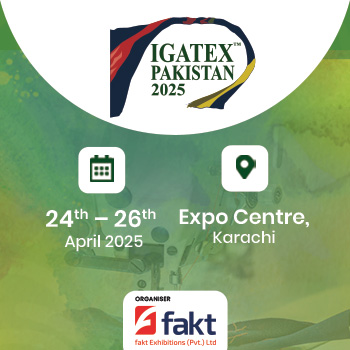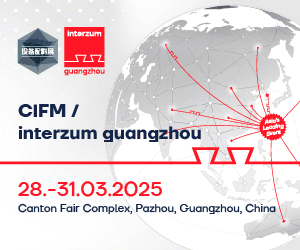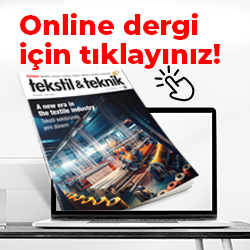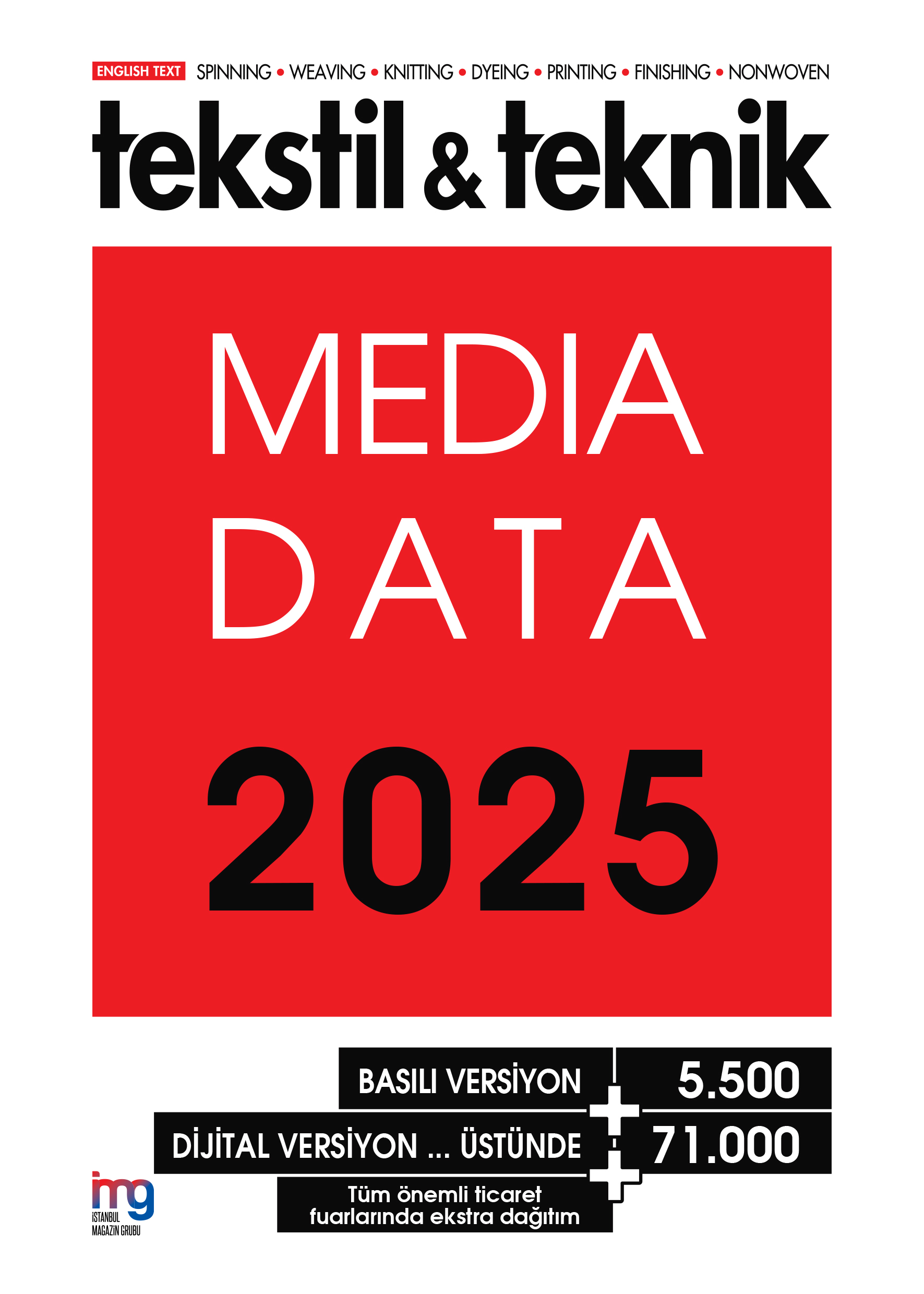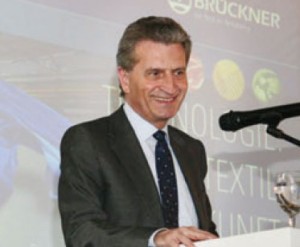 Brückner inaugurated with a celebration its new technology centre in Leonberg. Günther Oettinger, CE Commissioner for Energy inaugurated together with Regina Brückner, Axel Pieper and many customers the new hall with the testing machine. “Our focus is for years already the development of lines which are energy efficient, re-source saving and optimally designed for our customers. Solely our productive and flexi-ble manufacturing in Germany allows us to meet the high expectations of our customers and to supply our products rapidly and with consistently high quality” emphasizes Regina Brückner in her speech. “In this context we developed a completely new and energy-efficient machine generation which we put now into operation with a celebration in our technology centre at our Leonberg site and which is available for test and development purposes.” Dr. Klaus Jansen, Managing Director of the German Board of Trustees for Textile Research (Forschungskuratorium für Textil) presented the visitors in an interesting address the many chances and possibilities of the textile world. Which changes have to be strived at and which products must be realized to be well prepared for the future? And which fields of applications willexist in future for textiles, which materials will be replaced? Dr. Jansen showed numerous examples, reporting for example about adaptive sun protection with energy generation, construction materials made of renewable raw materials, textile sub-strates for bio mass growing, about energy storage in fibres and textiles and last but not least about the recycling of garments and the integration of function into fibres. The guest of honours Günther Oettinger, CE
Brückner inaugurated with a celebration its new technology centre in Leonberg. Günther Oettinger, CE Commissioner for Energy inaugurated together with Regina Brückner, Axel Pieper and many customers the new hall with the testing machine. “Our focus is for years already the development of lines which are energy efficient, re-source saving and optimally designed for our customers. Solely our productive and flexi-ble manufacturing in Germany allows us to meet the high expectations of our customers and to supply our products rapidly and with consistently high quality” emphasizes Regina Brückner in her speech. “In this context we developed a completely new and energy-efficient machine generation which we put now into operation with a celebration in our technology centre at our Leonberg site and which is available for test and development purposes.” Dr. Klaus Jansen, Managing Director of the German Board of Trustees for Textile Research (Forschungskuratorium für Textil) presented the visitors in an interesting address the many chances and possibilities of the textile world. Which changes have to be strived at and which products must be realized to be well prepared for the future? And which fields of applications willexist in future for textiles, which materials will be replaced? Dr. Jansen showed numerous examples, reporting for example about adaptive sun protection with energy generation, construction materials made of renewable raw materials, textile sub-strates for bio mass growing, about energy storage in fibres and textiles and last but not least about the recycling of garments and the integration of function into fibres. The guest of honours Günther Oettinger, CE 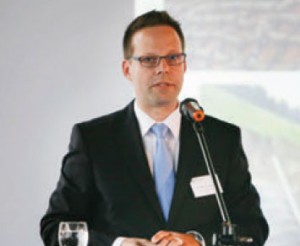 Commissioner for Energy emphasized in his speech the importance and creativity of the German small and medium sized companies which provides for clearly more jobs than the big industry. Moreover he made clear that we will need in Germany also in future a manufacturing industry and that we should not transfer all production-related jobs abroad. At the same time he showed a lot of under-standing for the textile companies in Germany which brought in an action against the EEG (German Renewable Energy Act) contribution. It is unacceptable that companies do invest to reduce their own energy cost but have to pay therefore clearly more EEG contri bution. Such companies have no possibility to plan and the jobs are in danger. In his opinion there are rightly doubts about the constitutionality of the EEG contribution. Nevertheless he deems it important to continue in saving energy costs and he congratu-lated Brückner on the new successful machine concept which is an important support for the textile processing industry regarding the reduction of their energy consumption. With the con
Commissioner for Energy emphasized in his speech the importance and creativity of the German small and medium sized companies which provides for clearly more jobs than the big industry. Moreover he made clear that we will need in Germany also in future a manufacturing industry and that we should not transfer all production-related jobs abroad. At the same time he showed a lot of under-standing for the textile companies in Germany which brought in an action against the EEG (German Renewable Energy Act) contribution. It is unacceptable that companies do invest to reduce their own energy cost but have to pay therefore clearly more EEG contri bution. Such companies have no possibility to plan and the jobs are in danger. In his opinion there are rightly doubts about the constitutionality of the EEG contribution. Nevertheless he deems it important to continue in saving energy costs and he congratu-lated Brückner on the new successful machine concept which is an important support for the textile processing industry regarding the reduction of their energy consumption. With the con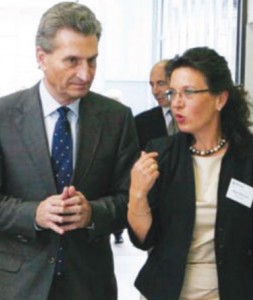 struction of its technology centre Brückner avows clearly to Germany as a location for industry and gives his employees but also his customers and partners certain-ty. Günther Oettinger empasized further that it is important for the German industry to have tradition-conscious family-owned enterprises and praised again the considerable in-vestment at the company base in Leonberg. Axel Pieper explained in his speech the numerous benefits of the technology centre and presented the testing machine in detail. “During the planning phase of a complex machine it is often necessary to make extensive pretests. The new line shall support our customers to develop new products, to make tests, evaluate them in our own laboratory and to de-fine the exact machine configuration for a later production. Together with our own tech-nologists we can thus make the bridge between machinery and process technology. Up to now such tests could be made only on laboratory scale. But in future we can make these tests in our own house and in close dialogue with customers and partners of the chemical industry. In addition, the BRÜCKNER’s own testing line is an ideal basis for further product developments and optimizations. The technology centre offers the most different coating and finishing possibilities for tests on a production scale. For interested persons it is any time possible to rent the hall and the machine. In addition our experienced technologists which have an extensive knowledge of the machines can give valuable hints about the latest technologies. For commission finishers we offer to make pretests in our technology centre before starting a new production. We are of course looking forward to develop new products with custom-ers and to implement new ideas.
struction of its technology centre Brückner avows clearly to Germany as a location for industry and gives his employees but also his customers and partners certain-ty. Günther Oettinger empasized further that it is important for the German industry to have tradition-conscious family-owned enterprises and praised again the considerable in-vestment at the company base in Leonberg. Axel Pieper explained in his speech the numerous benefits of the technology centre and presented the testing machine in detail. “During the planning phase of a complex machine it is often necessary to make extensive pretests. The new line shall support our customers to develop new products, to make tests, evaluate them in our own laboratory and to de-fine the exact machine configuration for a later production. Together with our own tech-nologists we can thus make the bridge between machinery and process technology. Up to now such tests could be made only on laboratory scale. But in future we can make these tests in our own house and in close dialogue with customers and partners of the chemical industry. In addition, the BRÜCKNER’s own testing line is an ideal basis for further product developments and optimizations. The technology centre offers the most different coating and finishing possibilities for tests on a production scale. For interested persons it is any time possible to rent the hall and the machine. In addition our experienced technologists which have an extensive knowledge of the machines can give valuable hints about the latest technologies. For commission finishers we offer to make pretests in our technology centre before starting a new production. We are of course looking forward to develop new products with custom-ers and to implement new ideas.
Finishing and functionalizing with a padder
The increasing requirements regarding resistance (for example washing resistance, fast-ness) and functionality (for example flame protection, water repellency, antistatic) of tex-tiles requires a great number of new technologies to be developed. For this purpose the interaction of textile substrate, finishing system and extensive machine know-how is ex-tremely important.
Application with the minimum
application process
The application with a minimum application process can save an enormous amount of en-ergy. The optimum interaction of chemistry and machinery engineering is of considerable importance. For technical textiles and functional textiles we offer in our testing line the possibility of a minimum application with dosing roller or floating knife.
Coating with knife-over-air or knife against cylinder, dosing roller or rotary screen
Our testing line allows the coating of water-based pastes and stable foams as well as ap-plication technologies for full-faced and intermittent coating.
Laminating with our dry laminating calender
With our dry laminating calender we can offer different laminating techniques, for exam-ple for functional material composites, for the pressing of foam coating systems, the pressing of foams for tightness, protection barriers against chemicals, vapour barriers and the connection of different substrate materials. The lamination technique will find its ap-plication mainly in the field of technical textiles.
Heat-setting with the latest energy-saving dryer generation
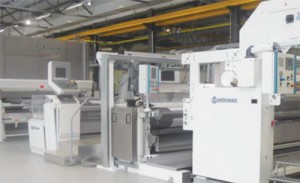 The heat-setting process has established itself for the finishing of fabric types when cer-tain characteristics shall be positively influenced, for example to increase the material strength or to suppress the shrinking effect when heat is added. Heat-setting processes are also suitable for the functionalizing of non-wovens. In addition, the new line offers the possibility to finish fabric with up to 270 °C, which is particularly required in case of some applications in the field of technical textiles. The additional process monitoring with straighteners to correct inclined or bow distortions, fabric centering units, measuring of weight per m2 and thickness allows to make optimiza-tions during the execution of the test. An exactly reproducible documentation allows in addition to transfer the parameters to further processes. Our testing line can be used for manifold processes and applications with different fabric types. Contact us! We will sup-port you in your product developments.
The heat-setting process has established itself for the finishing of fabric types when cer-tain characteristics shall be positively influenced, for example to increase the material strength or to suppress the shrinking effect when heat is added. Heat-setting processes are also suitable for the functionalizing of non-wovens. In addition, the new line offers the possibility to finish fabric with up to 270 °C, which is particularly required in case of some applications in the field of technical textiles. The additional process monitoring with straighteners to correct inclined or bow distortions, fabric centering units, measuring of weight per m2 and thickness allows to make optimiza-tions during the execution of the test. An exactly reproducible documentation allows in addition to transfer the parameters to further processes. Our testing line can be used for manifold processes and applications with different fabric types. Contact us! We will sup-port you in your product developments.


